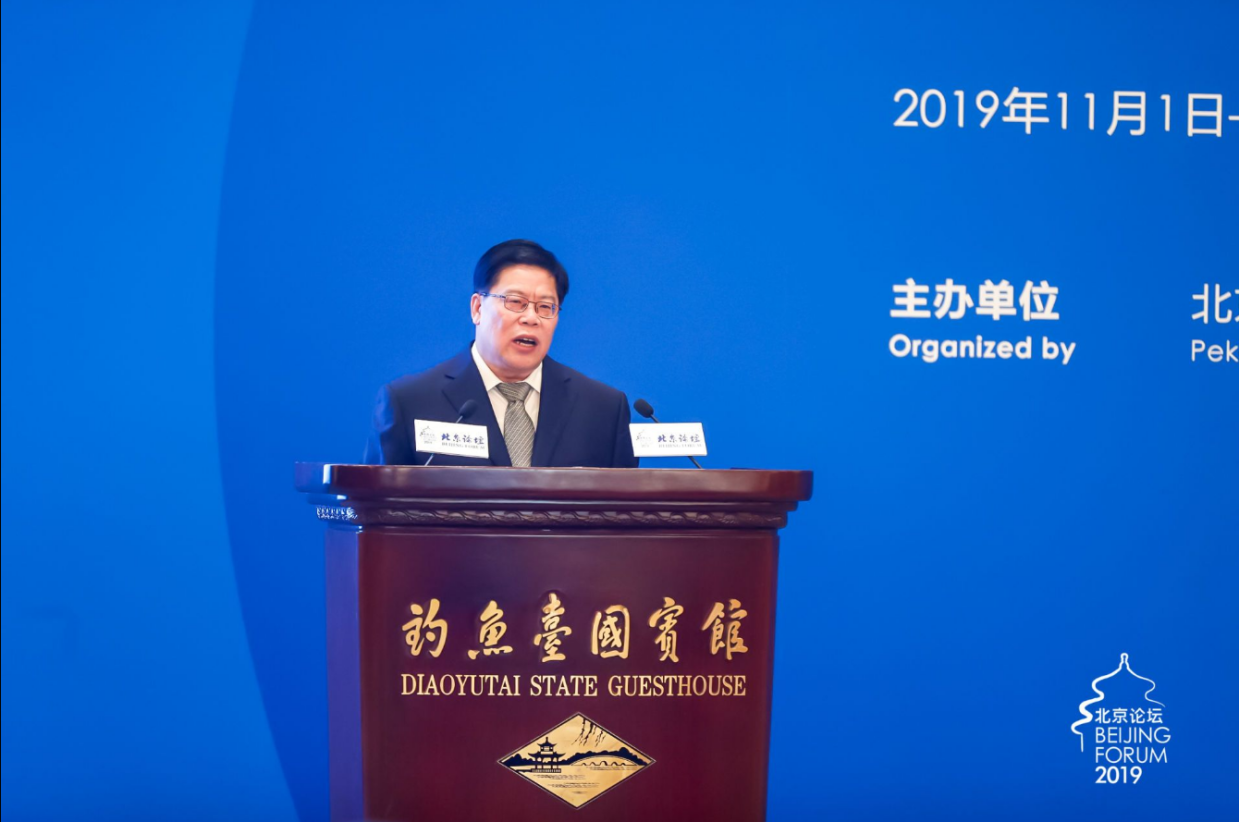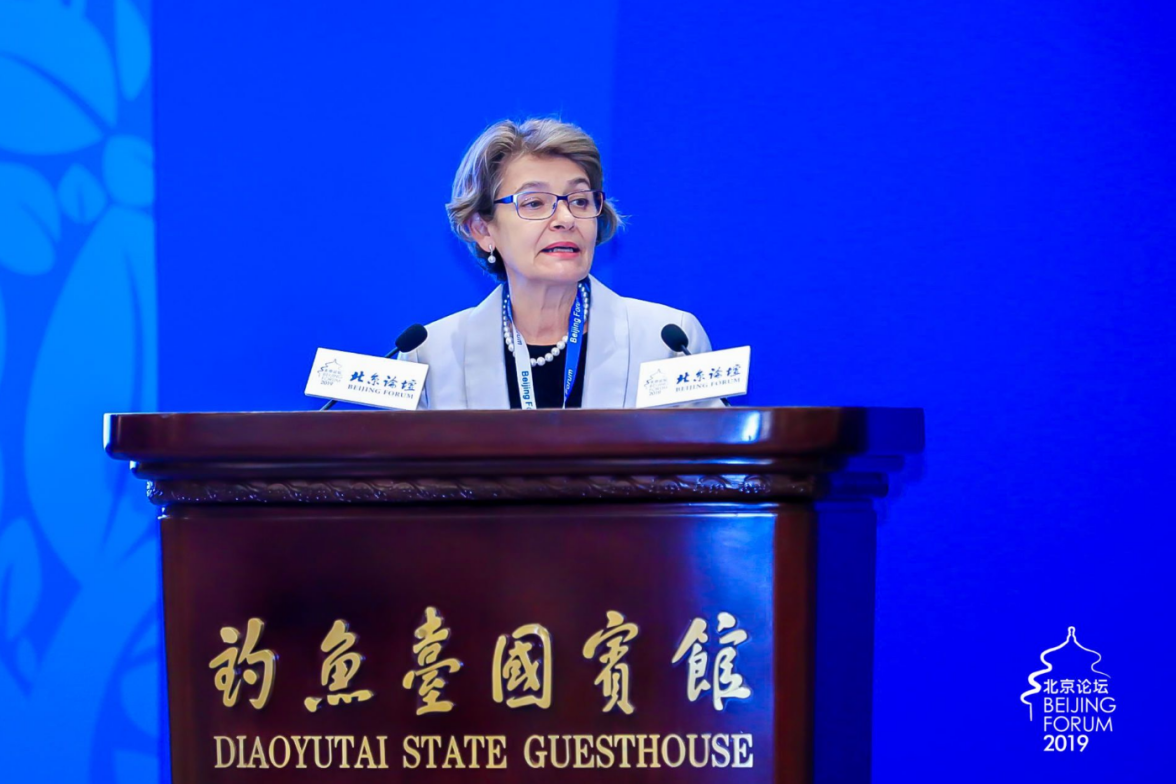[Beijing Forum 2019] Beijing Forum 2019 puts the spotlight on harmony and prosperity for all
Nov 04, 2019
Peking University, Nov. 4, 2019: The Opening Ceremony of Beijing Forum was held on November 1 at Diaoyutai State Guesthouse with the theme “The Harmony of Civilizations and Prosperity for All—the Changing World and the Future of Humankind”.
 The Opening Ceremony of Beijing Forum 2019
The Opening Ceremony of Beijing Forum 2019
Now in its 16th year, the forum has drawn a great number of eminent scholars, experts and dignitaries from around the world. The forum was held under the auspices of the Chinese Ministry of Education, with the support of the Beijing Municipal Government. It was co-sponsored by Peking University, the Beijing Municipal Commission of Education and the Korea Foundation for Advanced Studies.
This year’s forum was attended by over 500 guests from 60 countries and regions, including 21 university Presidents from 17 African nations.
Speaking at the opening ceremony, Yang Jiechi, member of the Political Bureau of the CPC Central Committee and director of the Office of the Foreign Affairs Commission of the CPC Central Committee, urged the audience to “see through the mist of change and grasp the trend of history.”

Yang Jiechi
According to Yang, that trend is economic globalization.
“The world economy has grown into something like the ocean. As President Xi Jinping has rightly pointed out, ‘To channel the waters in the ocean back into isolated lakes and creeks is simply not possible.’”
“In today's world, multi-polarity is clearly the order of the day.”
Yang pointed out China’s contributions to the world. China has generated 30 percent of global growth in recent years and is a major trading partner and export market for over 130 countries and regions. The latest development in that process is the “great success” of the Belt and Road initiative, which ties into China’s “unswerving” commitment to peaceful development.
“The country knows best the value of peace. Since ancient times, China has cherished a love of peace and pursued harmony without uniformity. This is the belief embedded in the Chinese national DNA. To follow the path of peaceful development is a strategic decision China made based on its national reality. It also represents the common desire of peoples around the world.” Moreover “the world can count on China as a promoter of world peace, contributor to global development, and upholder of the international order.”
Qiu Shuiping, chair of Peking University Council, presided over the opening ceremony. Qiu emphasized the value of diverse, equal and tolerant civilizations as put forward by Chinese President Xi Jinping.
 Qiu Shuiping
Qiu Shuiping
“As an old Chinese saying goes, united we stand, divided we fall. We must join hands in building a community with a shared future for mankind where people shoulder responsibilities together, cooperate through win-win solutions, prosper together, advance cultures together and maintain security together. In this way, the common challenges that we face can be addressed.”
Qiu touched upon the work of Peking University as part of its “Global Excellence Strategy” launched in May this year. Thus far, Peking University has built bilateral relations with more than 300 universities and research institutions from over 60 countries and regions. “The Beijing Forum plays an important role in driving Peking University’s internationalization process,” Qiu said.
Hao Ping, president of Peking University, said despite the ups and downs in the past 16 years, Beijing Forum has always been committed to promoting academic exchanges and development in the Asia-Pacific region and beyond, as well as advancing social progress. Hao summarized three core values of the Beijing Forum.
 Hao Ping
Hao Ping
“Firstly, the Beijing Forum has always shown care for human destiny and concern for human civilizations, building a bridge between academic research and real-life problems. Secondly, the Beijing Forum has always been dedicated to promoting civilizational dialogues and exchanges in international academia, allowing the world to know China better and vice versa. Thirdly, the Beijing Forum has always regarded civilizational harmony as the theme of our times, focusing on the changing world and looking out for people’s future,” Hao said.
“Beijing Forum will continue to stick to the global governing concepts of consulting together, contributing together and sharing together, and will also strive to build a community with a shared future for mankind,” Hao added.
António Guterres, secretary-general of the United Nations, expressed his appreciation to Beijing Forum for its “support for international cooperation and shared solutions”.
 António Guterres
António Guterres
“Our world faces challenges on many fronts. Leaders and institutions must work together to deliver. Together, let us strive to put the needs, aspirations, rights and hopes of people first,” Guterres said.
Wang Ning, member of the Standing Committee of the CPC Beijing Municipal Committee, spoke of noble ambitions and our shared responsibilities. He stressed that China’s unparalleled development has come hand-in-hand with the development across the world, and this could not be clearer in a cultural, political, scientific and economic hub like Beijing.
 Wang Ning
Wang Ning
Chey Tae-won, chairman of SK Group, discussed the resurgence of geopolitics and technological progress as the two big shifts facing today’s economies, societies and the world order.
 Chey Tae-won
Chey Tae-won
He called on the audience to “break the ceiling and pursue balance, harmony and happiness.” Humanity’s accomplishments to date is a piece of “good news”, but the “bad news” is that there is much more left to do.
Irina Bokova, former director-general of UNESCO, spoke of a “paradigm shift” in science and higher education, which has become an objective on its own on the global stage.
 Irina Bokova
Irina Bokova
Quality education is the fourth in the United Nations Sustainable Development Goals. It is also a vital facet of poverty eradication. When discussing the role of higher education in realizing these goals, Bokova said universities have never been just about preparing young people for the workforce, but also about “values and citizenship” preparation for a globalized world. In a word, “effective education must include deep consideration of the human condition.”
In 2014, Chinese President Xi Jinping became the first ever Chinese head of state to visit UNESCO headquarters. Bokova recalled his portrayal of humankind as “an intimate community of shared destiny”. She raised the example of the ancient Silk Road as a “story of encounters” shaping civilizations over the ages and “a major social network way before the internet… driven by mutual progress and mutual respect.” To sum up, “no culture has flourished in isolation.”
The Beijing Forum 2019 spanned three days, with 13 panel sessions and three special panels. The panels centered around “Diverse Civilizations”, “The Changing World” and “The Future of Humankind”.
This year broke new ground with two innovative topics: “Pulse of the World: Archaeology ad Civilizations along the Silk Road” and “Women’s Initiative and Development over the Course of Civilization”. In addition, the forum put a spotlight on contemporary debates such as artificial intelligence and the Belt and Road initiative. After the opening ceremony, Beijing Forum’s panel sessions took place at various locations at Peking University.
Reported by: Cherry Zheng, Qiu Tianjie, Shi Jingjing
Edited by: Huang Weijian







